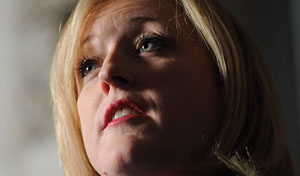The Conservatives have tabled legislation to force striking Canadian Pacific Rail workers to go back to work. Negotiations broke on Sunday and 4,800 locomotive engineers and conductors have been on strike since Wednesday, shutting down all freight traffic across the country.
Labor Minister Lisa Raitt told CBC News that she was “disappointed” that both sides rejected a proposal by a government-appointed arbitrator. The initial points of argument started from pensions.
“I have to say there doesn’t seem to be a prospect of a deal right now, and I’m extremely disappointed,” Raitt said.
Ed Greenberg, spokesman for Canadian Pacific Rail, said Sunday that “the talks have ended and the legislative process, as I understand it, will now commence.”
“They [CP] want to rely on the government to get something for them instead of collective bargaining, and we believe their actions are essentially in bad faith,” said Doug Finnson, chief negotiator for the Teamsters Canada Rail Conference.
Raitt said that the CP strike was costing the Canadian economy million per week.
Meanwhile, one must ask what purpose the government should have in these matters. While the Conservatives rush in for management and the NDP rush in for their unions, are either side right by racing in?
Perhaps labor unions and management should be left alone to negotiate without government interference and without obvious government bias. Besides, don’t we live in a free society? People have the right to strike and the economy should be fine without the government needing to weigh in on every issue and dispute.
Should the government interfere with labor disputes?
Categories: Economy
Tags: Conservative
On Monday, the longest campaign in modern history will come to a close and if current polls are any indication, Canada may be seeing a change in government after 9 years of Conservative rule under the leadership of Stephen Harper. Accountability was his calling card in 2006 and today, accountability may very well be one of the defining reasons for his departure.
On Monday, the longest campaign in modern history will come to a close and if current polls are any indication, Canada may be seeing a change in government after 9 years of Conservative rule under the leadership of Stephen Harper. Accountability was his calling card in 2006 and today, accountability may very well be one of the defining reasons for his departure.
In its length, in its cost and in its debate schedule, this election is unusual. The first and possibly only real debate of the campaign ended and here are the highlights of what happened.
In its length, in its cost and in its debate schedule, this election is unusual. The first and possibly only real debate of the campaign ended and here are the highlights of what happened.
Prime Minister Stephen Harper left Rideau Hall this morning with Governor General David Johnston’s approval to drop the writ and Canadians are now officially headed to the polls on October 19. For the first time since fixed election date legislation was brought in by the Conservative government, a fixed election date has been followed.
Prime Minister Stephen Harper left Rideau Hall this morning with Governor General David Johnston’s approval to drop the writ and Canadians are now officially headed to the polls on October 19. For the first time since fixed election date legislation was brought in by the Conservative government, a fixed election date has been followed.
Share this
article with your friends!
What do you think? Leave a comment!




